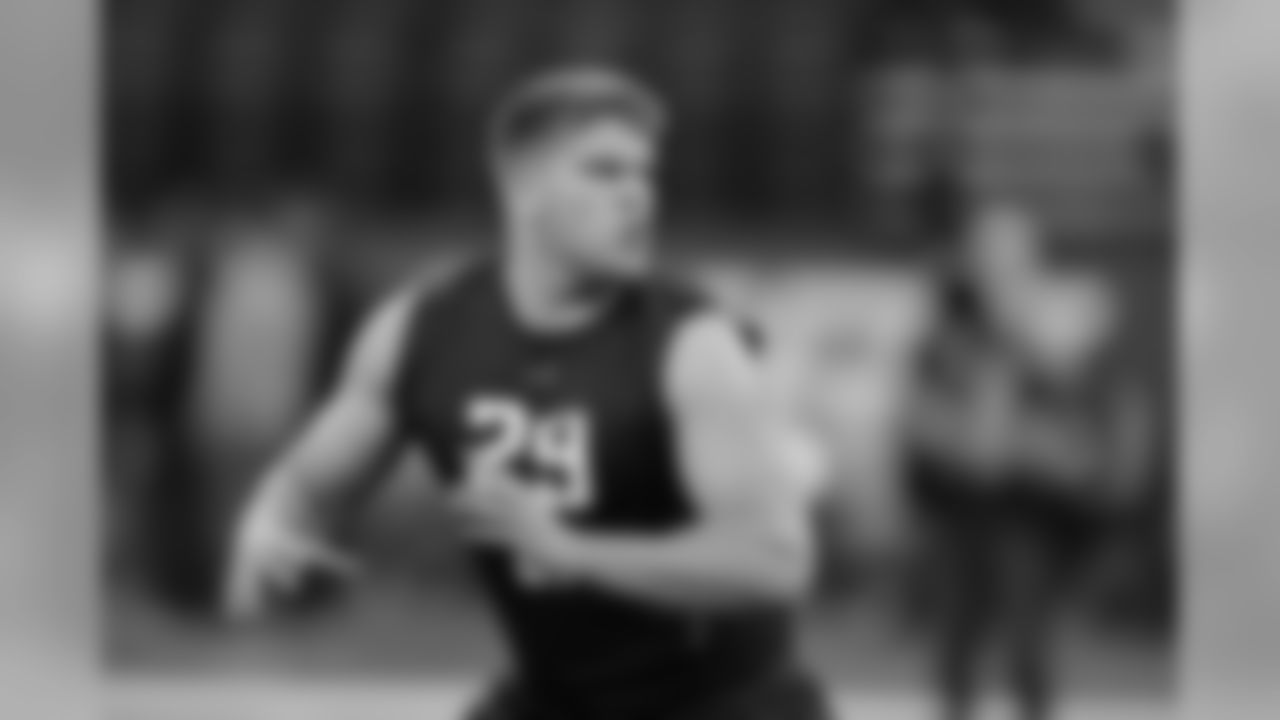INDIANAPOLIS — With Interstates going vertically, horizontally and diagonally through Indiana, it's easy to understand why "The Crossroads of America" is the state's official motto.
But the intersection of a hard-nosed football background and new-school analytics applications? Well, for the Vikings, that's any meeting between Senior Vice President of Player Personnel Ryan Grigson and Vice President of Football Operations Demitrius Washington.
Both were brought to Minnesota last year by General Manager Kwesi Adofo-Mensah.
Their offices at Twin Cities Orthopedics Performance Center share a wall, but the paths each took to get there were quite different.
Grigson grew up in Highland, a town of 23,000-plus in the steel mill territory of northwest Indiana. Hoosiers call that part of the state "The Region," and it has much in common with nearby Chicago, where Grigson would go to attend Bulls, Blackhawks and Bears games from time to time. He also watched Cubs games at his grandfather's home, listening to Harry Caray provide entertaining commentary for a routinely non-competitive team.
Washington grew up in Rison, Arkansas, with about 1,100 other residents and no strangers. There's one stoplight and another blinking light, a grocery store and a pizza place with a pool table in the hometown shared by Washington and Vikings 2008 second-round draft pick Tyrell Johnson.
The industrial Midwest and rural South connected in the NFC North, where Minnesota wants to defend its 2022 division title and continue to raise the standard.
We talked to Grigson and Washington in separate interviews this week at the 2023 NFL Scouting Combine to learn more about their journeys, as well as how their previous experience and varied learnings impact the way to work together.
A football guy …
Although several parts of Grigson's youth were more connected to Chicago than Indianapolis, ties to Indiana increased over time.
They include playing offensive line at Purdue, where he met his wife. Grigson's career with the Boilermakers also included overcoming a dramatic injury suffered against Minnesota in 1992.
"I ended up getting acute pancreatitis, which is usually an injury you get in a high-speed collision when the steering wheel hits you in the stomach, so they said it was either a blow from a helmet or a perfectly placed elbow to make that force of an impact, in a pile or something," Grigson mentioned during a radio interview on 9 to Noon this week. "I don't remember when it happened. We won the game, so that was something that helped me get through it. I was playing through a neck injury at the time, and I had some meds for my neck, so I probably didn't feel it as much, but that was a different era. It was a four-week stay in a hospital.
"It was odd because even then as naïve and immature as I was when I was 20, it took away my invincibility," he added in conversation with Paul Allen. "It rooted me in my faith, which I'll forever be grateful for to God above because without that extreme moment in my life, I might not have really understood."
Grigson was drafted by Cincinnati in 1995, despite not being invited to the combine. He was working through more injuries at the time of the combine, so it wasn't the worst thing to not get invited.
"I had nothing, not even a sprained ankle from playing football my whole life, playing sports my whole life, up until my sophomore year at Purdue when I got hurt like I did," Grigson said. "After that, it was like what I call an 'IBG.' I became an injury bug guy, and I just couldn't shake it. It happens sometimes, and sometimes it's mental, but it was like, I hurt my back, and that was it."
After being waived by the Bengals, Grigson was claimed by the Lions, but the back injury kept him from taking the field for Detroit. He was with the Toronto Argonauts in 1997 before transitioning to coaching and scouting in 1998. The latter venture led to a scouting position with the St. Louis Rams in 1999, a first season as an NFL scout that ended with a ring from Super Bowl XXXIV.
After working for the Rams through 2003, Grigson joined Philadelphia from 2004-11, rising the ranks from a regional scout (2004-05) to Director of College Scouting (2006-09) to Director of Player Personnel (2010-11).
The Colts hired Grigson as their GM in 2012, and Indianapolis went 49-31 in five seasons, including 11-5 marks in each of Grigson's first three seasons in the role. The Colts went 3-3 in playoff games in that span and opted to part ways with him in 2017.
The father of six joined the Browns that season, commuting from Indiana because of his family's ties to Indiana. That season was followed by two with the Seahawks (2018-19) and two more in Cleveland (2020-21).
During Grigson's first four seasons with Indianapolis, Andrew Berry, who is now Cleveland's GM, was the Colts pro scouting coordinator. Berry's first stint with the Browns (2016-18) enabled them to reconnect and planted a seed for Grigson eventually working with Adofo-Mensah in Cleveland from 2020-21.
When Adofo-Mensah reached out after being selected as the Vikings GM, Grigson and the family opted to move to Minnesota.
"I wouldn't have moved my family — I had the greatest gig with Berry, and I could still see all my kids play if I needed to leave and do whatever and do something for my wife or see one of my kids or go to a parent-teacher [conference]," Grigson said. "I did this because I really believe in Kwesi. Not only his talent level but his drive. He's gotg a strong drive and he's a hard worker, and he expects everyone else to be. I think after year one, now the standard — I didn't know [Kevin O'Connell]. I love that he came from a championship-winning team. He's seen it and is fresh off a Super Bowl winner, but when Kwesi kept telling me, 'This dude is really good,' and everything he said has come to fruition. We won 13 games this year, and he's not satisfied at all. Neither of them are."
… connects with a quantitative analyst …
Rison shuts down completely when the high school football team is in the playoffs. The infectious love for the sport found its way to Washington's heart, but he also had a tremendous interest in math.
View photos of current Vikings players during their time at the NFL Scouting Combine from previous years.

2020 - WR Justin Jefferson

2012 - S Harrison Smith

2012 - CB Stephon Gilmore

2019 - TE T.J. Hockenson

2018 - T Brian O'Neill

2018 - DL Harrison Phillips

2019 - C Garrett Bradbury

2020 - S Josh Metellus

2022 - RB Ty Chandler

2022 - LB Brian Asamoah II

2022 - G Ed Ingram

2022 - WR Jalen Nailor

2016 - DL Jonathan Bullard

2017 - CB Shaq Griffin

2019 - OLB Andrew Van Ginkel

2019 - CB Byron Murphy Jr.

2023 - WR Jordan Addison

2020 - OLB Jonathan Greenard

2019 - LB Blake Cashman

2017 - RB Aaron Jones

2024 - DL Jalen Redmond

2024 - QB J.J. McCarthy

2024 - OLB Dallas Turner

2024 - T Walter Rouse
He earned a degree in finance from Central Arkansas, then read Moneyball, which spotlighted the sabermetric-based analytics approach that Oakland implemented to stretch its budget.
"I read Moneyball, and I was like, 'I'm good at math. I love football. I wonder if there's some sort of role like this in football, predictive analysis and stuff like that for player evaluations,' " Washington said, recalling the moments on the way to turning his passion into a profession. "So I actually started working on some projects and went back to grad school to refine my skills. It was a blessing to be able to get my foot in the door the way it happened, but it all happened after undergraduate."
Washington remained committed to the process even though one grad school ended its program in his first semester on campus. He then enrolled at the University of Missouri and earned an MBA in finance and analytics.
In 2015, Washington was working in Dallas for Raytheon when he met Adofo-Mensah.
Two weeks into that job, he received an email from Adofo-Mensah "about a job in San Francisco in analytics, which was something I had wanted to do for years.
"Within that, it took off from there," Washington added. "I did an interview the next day, and the rest is just history."
Adofo-Mensah didn't just select Washington to work for him. He was picking someone he'd share an office with for five years. The two affectionately called their workspace "The Lab." Through playings of "John" by Lil Wayne and Rick Ross, along with other songs, the two posed questions and collaborated to find answers.
"There was a lot of ideas. I think Kwesi and I are both very curious, so we ask a lot of questions, and in that position, especially in the beginning, we asked questions of ourselves, especially why things are done a certain way but not challenging it, just challenging the thought of it amongst ourselves," Washington said. "It's interesting now just seeing how it played out and how he's able to implement his ideas that were formulated in the office."
"The Lab" provided a space for Washington and Adofo-Mensah to build their friendship through long hours and the trust to challenge each other and reach conclusions — practical solutions.
"A misconception about our relationship is we have very similar thought processes, but sometimes we arrive at the same decision or different decisions in different ways, and we challenge each other in that way," Washington said. "I would say we help each other with blind spots."
The 49ers football research and development department blossomed and has seeded across the NFL. Adofo-Mensah headed to Cleveland to join Berry and Grigson — and Paul DePodesta, who had assisted A's GM Billy Beane with the implementation of sabermetrics in Oakland from 1999-2003.
Within two years, Adofo-Mensah was selected as Minnesota's GM. This year's hiring cycle including Tennessee selecting Ran Carthon as its new GM. Carthon had worked with Adofo-Mensah (2017-19) and Washington (2017-21) in San Francisco.
That time included a trip to Super Bowl LIV after the 2019 season. The 2021 team also advanced to the NFC Championship Game. Carthon explained in his press conference an anecdote from working with Washington.
… and they blend backgrounds
The backgrounds couldn't be much different, but Grigson and Washington share a similar passion for football.
Both are able to draw from unique learnings and deliver information for Adofo-Mensah to evaluate on the way to making final decisions.
Grigson's authentic appreciation for grinders — it takes one to know one — drives him to put in the extra work on late-round prospects and think about potential if other factors come into the mix.
"I can contrast and juxtapose the things from my experience, so a lot of little things that maybe a kid in a small school that has a bunch of talent you can see on the film, that maybe doesn't have a plan and maybe doesn't have the support or the resources, there's some unrealized ceiling there because if he had a Smitty (Vikings Outside Linebackers Coach/Pass Rush Specialist Mike Smith) coaching him, he might make big jumps," Grigson said. "He might jump guys we liked on the second day of the draft. That's what makes it so fun for me because sometimes I find a guy like that, and that flicker I see on tape of some of these guys, because to me, I've always felt like it doesn't take a guru to pick out the great players that are going to go in the first round. It doesn't take a great eye. It takes beating the bushes. Kwesi calls it 'the sickness.'
"You have to be passionate about it to where if you don't find the answer right in front of you, the great ones and the great departments in the league, historically, they don't just stop," Grigson added. "They're going to try to find a player. It takes imagination and rejection and beating the bushes. It takes extra work, so they go do extra work, but the great staffs, they not only do it, they like doing it."
That intense approach can be helped by analytics helping analyze data to whittle down information "so it's a select, certain thing," Washington said.
"Certain models we have can be very complex, but we could whittle it down to three different traits if we're talking about production traits that will lead to future success or athletic traits," Washington said. "We can narrow it down to about three we can focus on, and every piece of information is valuable, but homing in on what's most important is what we try to do.
The combine — and pre-draft process — can prompt an information overload.
Teams collect medical information, physical metrics and performances in timing and testing drills. They can split times run by players in the 40-yard dash into segments to find which players are fastest off the line of scrimmage and which ones hit another gear down the field.
Speed, strength and agility measured can help predict outcomes, but the heads and the hearts of players also matter. The latter are assessed in informal and formal interviews, plus the college campus visits made by scouts.
"The digging in the information takes a lot to process it," Washington said. "Most things can be quantified if we actually put a number to it. We could probably get there, but there is intuition involved. This is a people business. It's not always commodities. In that respect, there are gray areas and there is context that needs to be clued in instead of just running a certain algorithm on any of this stuff, even if it's production or physical traits, anything like that. There is a human aspect that needs to be clued in."
Grigson said one of Adofo-Mensah's best attributes is that he's a humanist while utilizing his intelligences to stack data and better inform opinions through the Bayesian statistics model. Sometimes more information can reinforce a thought on a player; sometimes it can lead to a re-thinking.
"You don't have to stick to your guys from an early look. I used to always stick to my guns and dig my heels in and I wouldn't be told anything else," Grigson said. "That was kind of how I was raised in it, but now, I could be sitting there in a meeting and someone can say something to me, and because I have that openness now, I can go off on a tangent, I get what he's saying. Maybe my perception was off here, so then I could find the middle.
"I think that's all Kwesi is trying to do, find the middle between all of these opinions and come out with the best outcome because he's a results guy, and it's very well-thought out, intentional and detailed," Grigson continued. "It's something an owner can look at, 'OK, we're not just shooting from the hip here. We're not just flying by the seat of our pants. We're not going on a whim or a gut feeling only.'
"I do think instincts are very important," Grigson added. "Based on experience, I think there's a big place for it, but the great thing about the data is if you have the data behind the gut and behind that first look, sometimes I'll see a guy on a handful of plays, 'OK, this is different.' In the past, I could lose my mind on a guy and forget about some of the other details because I was so drawn to the talent, so that's where the process has genuinely helped me in all of this because it cools my jets a little bit."
Washington has welcomed Grigson's football experience, and the two have quickly learned to speak the same, planar language.
"It's been awesome. Grigson has a lot more experience and knowledge in this industry than I have, especially in his world, which is traditional scouting, which is something I'm picking up more on as I grow my career," Washington said. "So being able to bounce ideas off him, being able to learn from him and vice versa. Our offices are right beside each other. We talk all the time; we bounce ideas off each other. It's really like an amazing thing for me to be able to experience that with him."
Grigson said he appreciates there's "no sugarcoating" of things by Washington and Adofo-Mensah.
"They both are emotionally intelligent enough, and I think I am, that there is going to be some discrepancies from old-school football mindsets and analytics," Grigson said. "There has to be this bridge, and it bridged quickly because Demitrius' office is right next to mine, and the players he's shared with me, I've loved. I've gotten excited about them, so all of a sudden you get that built-in trust and it comes from him.
"I think it's a perfect setup because we have a really strong cabinet with [Director of Player Personnel Ryan] Monnens, [Assistant Director of Player Personnel] Chisom [Opara], [Senior Personnel Executive] Jamaal [Stephenson], the whole crew and kind of a diverse background: pro, college, data, and then you converge and Kwesi as the decision maker can sit there and be like, 'All right, Demitrius likes this guy. Grigs likes this guy. Jamaal likes this guy.'
When different worlds converge in agreement, it can strengthen the belief in a decision.
"Andrew Berry, Kwesi and Demitrius, they're next-level intelligent, and I'm trying to learn what they know, but they also are cool enough to be like, 'Well, Grigs, I want to know what you know.' It's a great thing, and the way we've kind of, through the example we had in Cleveland, I think we're still making this group strive to what we had in Cleveland because I was always told there are no utopias in the NFL, but that group we had in Cleveland was almost utopian-like.
"There were no buzzkills. Everybody understood their role. There was never any ill-will," Grigson added. "Everyone respected each other's opinion, and we grinded things out together, and on draft day, it was a thing of beauty because you had an analytics guy teaming up with the football guy, and then [Browns Head Coach Kevin] Stefanski with both of us, so then Stefanski is like, 'Wow, if analytics and pro football are unified here,' then he's cool enough to be like, 'OK, maybe we should take this guy.' "



















